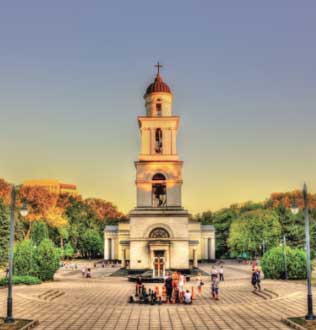Little Places, Big Issues
Societies Under the Reign of Social Media
September 7, 2018
Next Friday, God willing, I will be visiting Chisinau, Moldova. Moldova is the least visited country in Europe. It received only 11,000 foreign visitors in 2017—only one-fifth of the number who visit Liechtenstein! I will be among this year's 11,000 next week. I will be there (all expenses paid) to speak at the 12th World Congress of Families. My fellow editor, Allan Carlson, co-founder of the congress, will be speaking at the opening session, along with such dignitaries as Patriarch Kirill of Russia and Metropolitan Vladimir of Moldova. My talk will part of a panel on "New Media: Promoting Life, Marriage & Family in the Age of Hashtag Activism." The congress as a whole looks to bring together "East and West" around "the Beauty of the Family."

Moldova, a tad larger than Maryland, has just under 3 million people. Its main language is Romanian. Its capital is Chisinau (Kishinev). At one time Chisinau was the fifth largest city in the Russian Empire. In was founded in 1436 as a monastery village. By 1900, its population had grown to 125,000—43 percent of whom were Jewish. In 1903 and 1905, anti-Semitic riots broke out.
Chisinau suffered greatly during World War II. The region had been under Romanian administration until Red Army forces occupied it in June 1940. Then, in November 1940, a powerful earthquake hit. Romania, after a coup, had been led into an alliance with Germany by Ion Antonescu, who became dictator. So in July 1941, German and Romanian armies entered Chisinau; Nazi bombardments further damaged the city. It is estimated that 10,000 Jews of Chisinau were executed in its initial occupation by the fascists.
After three years of Axis occupation, Chisinau saw heavy fighting again as the German and Romanian troops withdrew as the Soviet Army advanced. On August 24, it was re-occupied by the Soviets. The day before, however, another coup, by King Michael I of Romania, was quickly followed by his declaration of war against Germany. After the war, Moldova was carved out of what had been part of Romania by the Soviets.
So, next week, in this place of much scene-changing, I speak on activists and social media. The speed with which a crowd or mob may be generated by activists' use of social media today is not only impressive but also troubling. Rumors spread fast and furious. But rumors and calls to action have spread fast and deadly many times—the rapidly growing cry of "Crucify him!" among Jerusalem's crowds, the quickly-kindled anti-Semitic riots of Kishinev, the explosive and lethal race riots of Detroit in 1942 and again in 1967. Pogroms, riots, lynch-mobs, coups, revolutions, the toppling of dictators—any of these can be kindled by a word, a message, using various media.
Some think that we are advanced, with our "new technologies" and "new media." We now have "social media," not to mention "social justice" instead of just plain media and plain justice. I am not sure why making a point through Facebook is "social." The media of monks chanting the poetry of David in the monastery village of Chisinau in 1436, or of Dominican friars preaching from the Epistles of St. Paul, or you writing a letter of witness to a friend—are these any less social?
The words of Scripture, Psalms, hymns, and sermons are pronounced from person to person, to produce faith, action, peace, or struggle. We are word-bound creatures, needing to think, act, feel a certain way because it is right, and reject other ways because they are false. We have ears to hear, and media is our lifeline to the wordiness, the logic, of the created world in which we live. Truth is mediated to us in a thousand ways, and falsehood present in the guise of truth.
In Moldova, next week, there will be listeners, and speakers using media-mikes, paper, video screens, power point, internet, radio, television. Their words will be to argue a point of truth: The Family as the bedrock of society. Have children. Raise families. They are irreplaceable. They are your riches. They are your future. To resist those who threaten the family with deadly falsehoods is a good work, even a mercy. The future of Moldova lies in its children. Same here, everywhere. Are they welcomed as gifts or problems?
Yours for Christ, Creed & Culture,

James M. Kushiner
Executive Director, The Fellowship of St. James
—James M. Kushiner is Executive Editor of Touchstone: A Journal of Mere Christianity, and Executive Director of The Fellowship of St. James.







